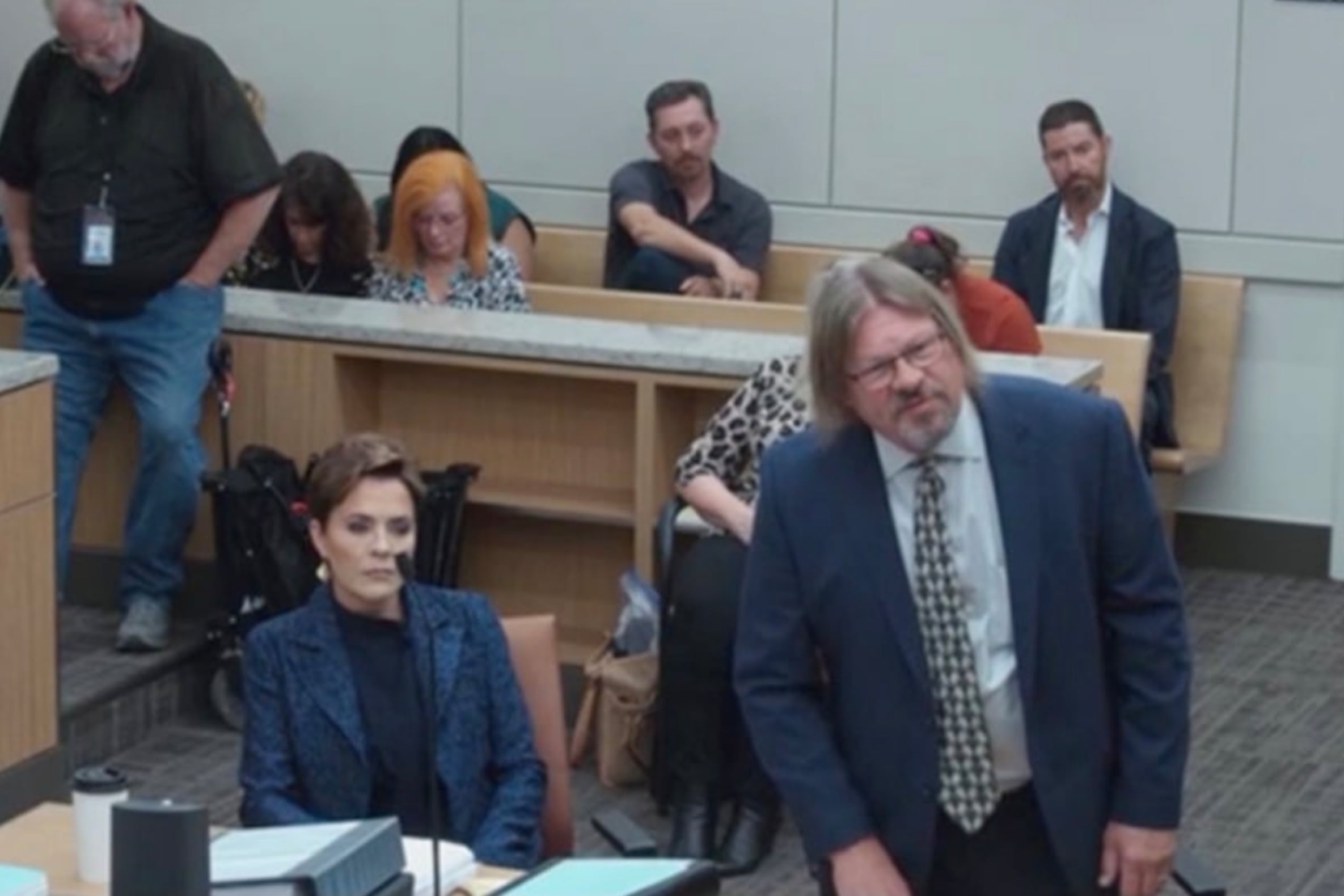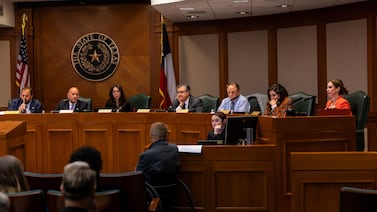Votebeat is a nonprofit news organization reporting on voting access and election administration across the U.S. Sign up for Votebeat Arizona’s free newsletter here.
At a state bar association event on election law last month, a jovial mood turned to silence after Arizona Secretary of State Adrian Fontes told the assembled lawyers that they need to do a better job of upholding their professional standards.
Election lawyers are filing too many frivolous cases “just because the plaintiffs are mad at their political opponents,” Fontes said at the podium, and they’re endangering public faith in democracy.
To back up his admonition — which has not been reported previously — he cited the unprecedented number of election lawyers who are being sanctioned by the courts over frivolous claims. Judges in Arizona have issued penalties in at least five cases against lawyers who have filed election lawsuits since 2020 — as much as $122,000 in one case — and the bar association has received ethics complaints against more than two dozen lawyers.
But the rise in sanctions and disciplinary scrutiny is prompting debate about exactly when lawyers who bring election challenges are crossing the line, and whether professional standards of conduct have shifted.
Professional standards prohibit attorneys from bringing frivolous cases and require that cases be brought in good faith. As the presidential election approaches, the Arizona Supreme Court and the state bar association are grappling with how to apply those standards in practice.
Lawyers should know, for example, that they can’t mislead the court. But it’s not always clear how much investigating a lawyer is obligated to do before deciding whether a case has enough merit to pursue, especially given the tight timeline under the law for challenging election results. While officials such as Fontes argue that sanctions are necessary to deter frivolous litigation, others worry that the threat of punishing lawyers could chill claims that deserve to be heard by a court, even if they’re long shots.
This month, the state Supreme Court reversed $27,000 in sanctions issued by lower courts in connection with a 2020 case filed by the Arizona Republican Party. The lower courts found that the party had filed the lawsuit in bad faith, against the wrong plaintiffs at the wrong time, and that the lawyers should be sanctioned for that. But the Supreme Court felt differently, issuing a broader message about when sanctions are appropriate, and when they are not.
“Our courts should be cautious that, in their zeal to ensure that election challenges are properly grounded in fact and law under the guise of defending an ‘election’s legitimacy,’ they do not inadvertently inflict real damage to our republic by slamming the courthouse door on citizens and their counsel legitimately seeking to vindicate rights, which is also important to maintaining public confidence in elections,” the opinion said.
Of the lawyers facing ethical complaints related to the 2020 and 2022 elections, so far, two of them, elections lawyer and state Rep. Alex Kolodin and business lawyer Daniel McCauley, have admitted to breaking ethics rules and accepted punishment. But the bar dismissed at least 11 of the complaints, and at least 10 are still pending, a sign of how difficult it is to determine whether a lawyer has acted improperly.
Over the next month, the Arizona Supreme Court’s presiding disciplinary judge, Margaret Downie, will hear cases against three lawyers who represented 2022 GOP gubernatorial candidate Kari Lake. A hearing is scheduled for Tuesday to help Downie determine the punishment for one of them, Bryan Blehm. It will be the first public disciplinary hearing related to election law ethics complaints from the 2020 and 2022 cycle.
Downie ruled on April 30 that Blehm violated several ethics rules. But for Tuesday’s hearing, she wants to hear Blehm’s arguments about how the Supreme Court’s ruling on the GOP sanctions should affect his case.
Pinal County Attorney Kent Volkmer, who serves on the bar committee that reviews ethics complaints for probable cause before they go to the judge, said it’s a defining moment for both the state bar and the state as a whole.
Volkmer said decisions on sanctions or ethics violations can have dire consequences for a lawyer, financially and reputationally. At the same time, he said, the line between a meritorious claim and a frivolous one is “not bright. It’s not clear.”
2020 set the stage for new litigation landscape
Arizona law requires that lawsuits challenging election results, called election contests, be brought soon after an election is certified. The law also requires challengers to prove that problems, fraud, or malfeasance affected the outcome of the election. Historically, that has meant such lawsuits were narrowly targeted, usually involving tight races or specific issues that clearly could have affected the results. Election law was a niche field, providing cyclical, fast-paced, and predictable work for a small group of attorneys with experience.
But the field has changed dramatically since 2020, and the rash of ethics complaints against election lawyers is a recent development, according to a spokesperson for the state bar association.
Shortly after states certified the 2020 election, Sidney Powell, a lawyer who at one point represented former President Donald Trump, filed expansive lawsuits claiming widespread election fraud across multiple swing states, including Arizona, but provided few to no specifics.
Kolodin, a Republican election attorney in the state, served as local counsel for Powell’s Arizona lawsuit, which alleged that voting machine manufacturer Dominion was founded “to ensure computerized ballot stuffing and vote manipulation,” and that “hundreds of thousands of illegal, ineligible, duplicate or purely fictitious ballots” were cast in the 2020 election. A judge ruled Powell’s claims were “sorely wanting of relevant or reliable evidence.”
Other cases filed after the 2020 election were more typical, taking aim at specific problems or suspected problems during the election. But even in those cases, lawyers who brought the suits faced ethics complaints from lawyers associated with Democrats and some outside watchdog groups.
In addition to Kolodin, complaints took aim at some experienced Arizona election lawyers who represent Republicans, such as Kory Langhofer, Thomas Basile, Brett Johnson and Eric Spencer. The bar dismissed the complaints against all of those but Kolodin.
In November, Kolodin, who had received complaints after filing the Powell lawsuit and two others, agreed that he had violated two rules of professional conduct, one barring lawyers from bringing frivolous cases, and another that broadly targets various types of misconduct. He agreed to complete five ethics courses, including one focused on “meritorious claims and contentions.”
Kolodin now says he would have acted differently on the Powell lawsuit today, focusing on different claims and providing different supporting material.
But he also says he was caught up in shifting standards. Before 2020, he said, the sense was “as long as you don’t lie, cheat, or steal, you aren’t going to get sanctioned about it, so don’t worry about it.”
Conjecture not welcome in the courts
The case that produced the stiffest sanctions — $122,000 split between three lawyers — provides hints about what type of conduct goes too far.
As the 2022 election approached, Lake and secretary of state candidate Mark Finchem, both Republicans, recruited out-of-state lawyers to challenge the way Arizona counts ballots, based on claims that voting machines weren’t secure.
They included prominent Trump-supporting attorney Alan Dershowitz; Andrew Parker, a lawyer in Minnesota, working on behalf of an organization run by MyPillow CEO Mike Lindell, an election conspiracy theorist; and Washington-based lawyer Kurt Olsen.
When issuing the sanctions, U.S. District Judge John Tuchi wrote that the lawyers inferred inaccurate facts about elections, such as claiming that Arizona does not use paper ballots, and “other tangential allegations that provided little if any support for their claims.”
While “conjecture and speculation” may be advanced on TV or social media, Tuchi wrote, “such expressions are neither permitted nor welcomed in a court of law.”
This case gave rise to ethics complaints against Olsen and Parker, tied directly to their statements in this case. Downie will consider these cases in June.
2022 election contests help define bad faith
The way courts addressed claims during the midterm election provide more clues about when judges believe attorneys are bringing meritless cases in bad faith.
After the election, Lake, Finchem, and GOP attorney general candidate Abe Hamadeh all filed election contests challenging their losses, and many of their attorneys ultimately faced bar complaints or sanctions.
Hamadeh’s initial contest, related to whether election problems led to his narrow 280-vote loss, prompted no sanctions.
But when Hamadeh filed a separate legal action on related matters, Maricopa County Superior Court Judge Susanna Pineda found his repeated attempts to litigate the same issues worthy of sanctions. The penalties for him and his lawyer, Ryan Heath, have yet to be determined.
In Finchem’s case, Maricopa County Superior Court Judge Melissa Julian found that his contest was “groundless and not brought in good faith” in part because none of Finchem’s allegations of misconduct, even if proven true, would have been enough to change the outcome in his race, which he lost by 120,000 votes to Fontes.
She said it was apparent McCauley “had some awareness that this case lacked merit” because he said during oral arguments that he was less at risk of being disbarred than other lawyers, given his impending retirement.
Julian issued $40,656 in penalties for Finchem and $7,434 for McCauley, who is also the subject of an ethics complaint to the state bar.
McCauley recently agreed to accept a 30-day suspension of his law license, and to set his status as retired for one year upon reinstatement. He declined to comment.
This case and others speak to the need for lawyers to be confident their cases have merit before they bring them.
Julian wrote that McCauley had an obligation to investigate whether Finchem had viable grounds to challenge the result.
At the election law training, too, one lawyer who spoke stressed that claims brought on vague statements of “information and belief,” like many of the 2022 election contests, still have to have evidence behind them.
But Kolodin, who shepherded Powell’s 2020 case in Arizona, said it’s hard to speak generally about how much research must be done before filing an election contest. That’s part of why he thinks the Supreme Court, in its most recent opinion, said to “back off.”
“Lawyers need some breathing room,” he said.
Lake’s attorneys face discipline
The Supreme Court opinion may shape whether and how Lake’s attorneys are punished over claims they made when challenging the result of 2022′s gubernatorial election.
Lake was represented again by Olsen, as well as Blehm, a former family law attorney who oversaw the state Senate-commissioned audit of Maricopa County’s 2020 election.
In pushing the trial court for sanctions against the lawyers, Maricopa County attorneys wrote that they repeatedly brought “demonstrably false statements” and “frivolous arguments” in court, including that the election was “rigged.”
“Wrongfully and publicly asserting that the election was ‘rigged’ is heinous and profoundly harmful,” the county wrote.
The trial court did not issue sanctions. But the Arizona Supreme Court sanctioned the lawyers over one of their claims: that it was “undisputed fact” that about 35,000 illegal ballots had been inserted into the election results. This was a false representation, the court ruled, because the county and state had disputed the claim. The penalty was $2,000.
Undisclosed parties filed complaints through the bar association against Olsen and Blehm directly related to these sanctions. In their response, the lawyers asserted that they had never misrepresented anything to the court or violated any ethical rules. Neither of them responded to requests to comment.
The bar association’s probable cause committee decided in December to authorize the bar to proceed with formal complaints against Blehm, Olsen and Parker.
Downie has only issued a ruling in only one of those cases so far. In her April 30 ruling, she ruled in favor of the state bar on one of two counts against Blehm, finding that he violated four ethics rules, including one prohibiting lawyers from knowingly making a false statement of fact or law to the court, and another prohibiting engaging “in conduct involving dishonesty, fraud, deceit or misrepresentation.”
But for Tuesday’s hearing on the punishment, Downie told Blehm to bring an analysis of how the recent Supreme Court opinion reversing the Republican Party’s sanctions should affect his case.
She particularly wanted to weigh the relevance of a sentence in the opinion about political motives.
That line says, in part, that “any suggestion that a party or attorney faces enhanced risk of sanction merely because they couple political motives with a long-shot effort to vindicate a legal right in the election law context intolerably chills citizens and their attorneys precisely in an arena where we can least afford to silence them.”
Volkmer, who joined the bar association’s probable-cause committee this year after it had already considered the complaints against Lake’s attorneys, said that while there is good reason to deter bad faith cases, there’s a balance to strike.
“I think even marginal cases need their day in court,” he said.
But Andy Gaona, who has represented the Secretary of State’s Office in defending the state’s election said that sanctions and disciplinary proceedings through the state bar are the “only thing that can stem this tide of endless litigation over election results from becoming our new reality.” He called the Supreme Court’s reversal of the GOP sanctions an “unfortunate result for the system.”
Fontes agrees. He said in an interview after his bar speech that those who engage in unethical conduct in election contests should be considered for disbarment.
“If they are breaking the rules in an egregious enough manner that is actually harming our democracy, it’s hurting society, and it’s weakening the republic, then yeah,” Fontes said. “Why should they have keys to the courthouse?”
Jen Fifield is a reporter for Votebeat based in Arizona. Contact Jen at jfifield@votebeat.org.






